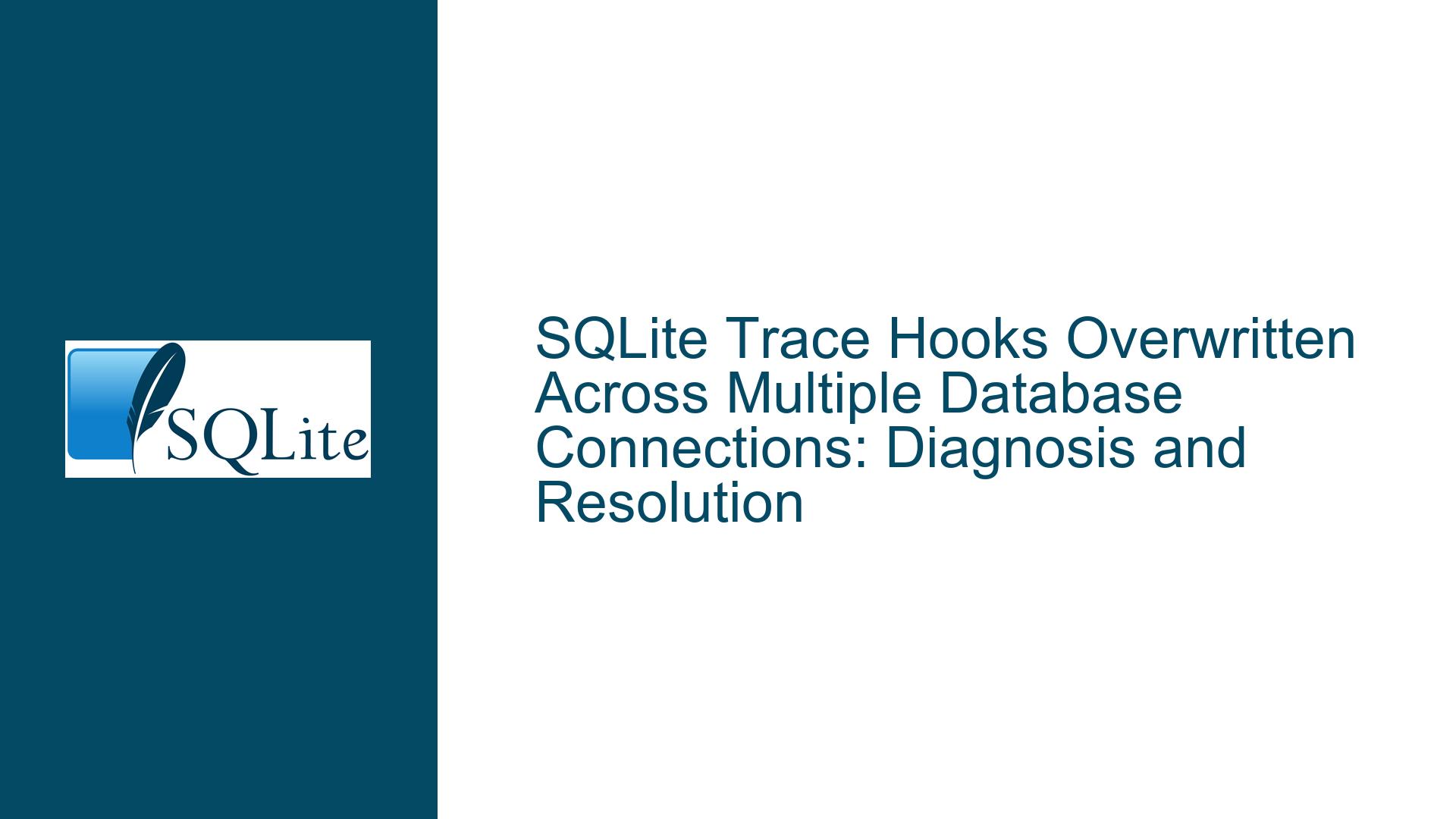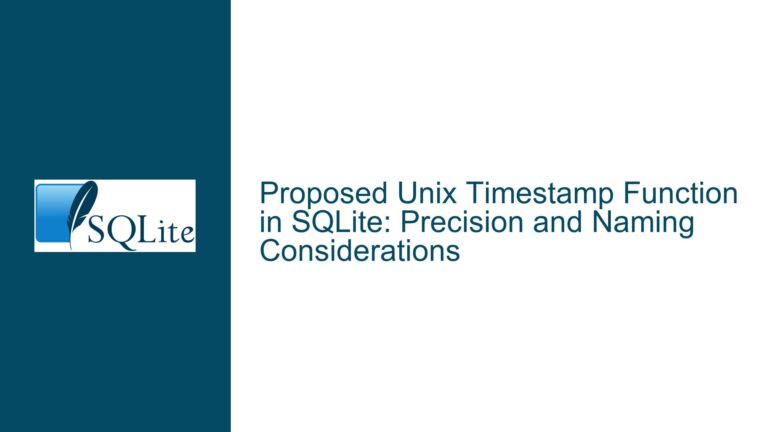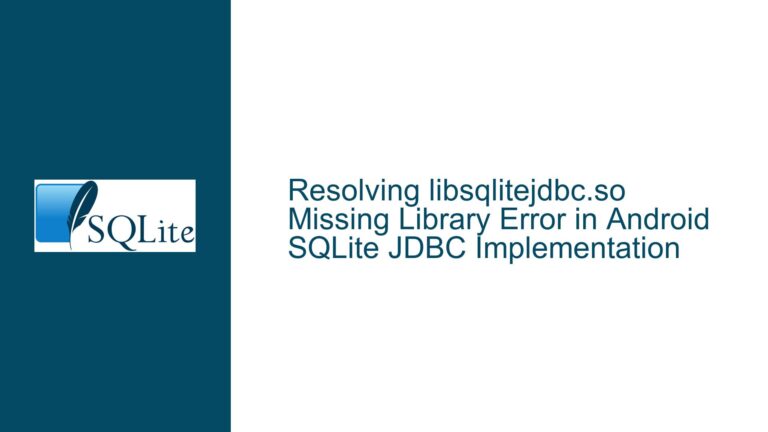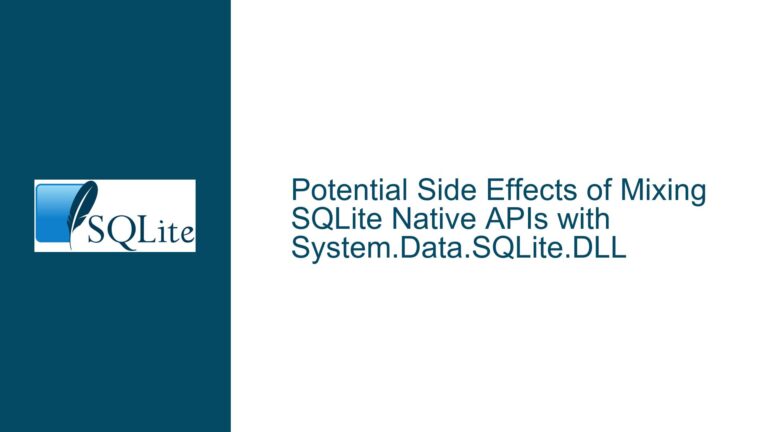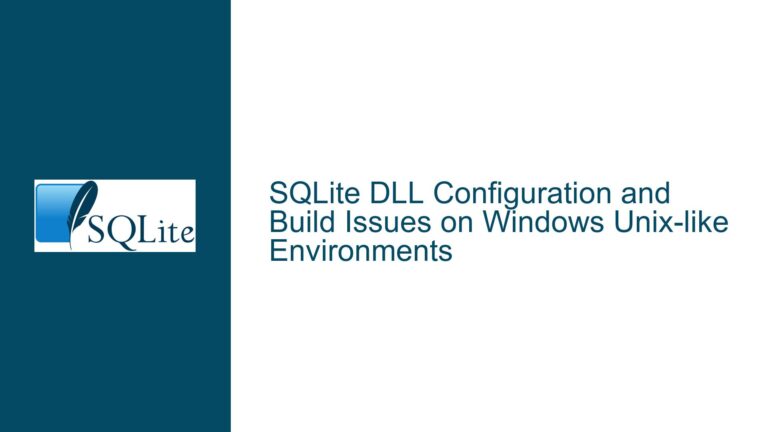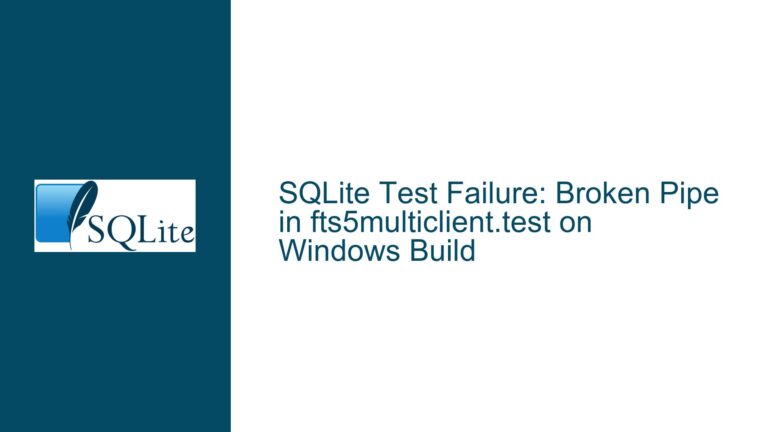SQLite Trace Hooks Overwritten Across Multiple Database Connections: Diagnosis and Resolution
Understanding Trace Hook Behavior in Multi-Connection SQLite Environments
Issue Overview: Trace Hook Registration Conflicts Between Database Connections
SQLite’s sqlite3_trace_v2 API is designed to enable developers to monitor SQL statements, execution plans, and other database events. However, confusion arises when attempting to register trace hooks for multiple database connections within the same process. A common misconception is that registering a trace hook for one connection overrides existing hooks for other connections, leading to incomplete or missing trace data. This behavior is often misinterpreted as a design limitation, especially in applications that use separate connections for read/write operations or parallel transactions.
The core issue stems from two factors:
- Ambiguity in Documentation: The original documentation for
sqlite3_trace_v2stated that each call to the API overrides prior trace handlers. This wording implies a global override across all connections, which is incorrect. - Improper Context Handling: Trace hooks require a context pointer (
pCtx) to associate callback data with specific connections. Failing to use this parameter correctly can lead to trace handlers being unable to distinguish between connections, creating the illusion of a global override.
When a trace hook is registered for a second connection without leveraging pCtx, the callback might receive events from both connections but lack the context to differentiate them. This creates a false impression that the second registration "clobbered" the first. The root cause is not a limitation in SQLite but a misconfiguration in how trace hooks are initialized and managed.
Root Causes: Documentation Ambiguity and Context Management Failures
Misinterpretation of API Scope
The original documentation forsqlite3_trace_v2stated:"Each call to either
sqlite3_trace()orsqlite3_trace_v2()overrides (cancels) any prior calls tosqlite3_trace()orsqlite3_trace_v2()."This phrasing suggests that trace handlers are process-wide, overriding all previous registrations. In reality, the override applies only to the specific database connection (
sqlite3*handle) used in the API call. For example:- Registering a trace hook on
Connection Aaffects onlyConnection A. - Registering a trace hook on
Connection BleavesConnection A’s handler intact.
The ambiguity arises when developers assume the API operates at the process level rather than the connection level.
- Registering a trace hook on
Insufficient Use of the
pCtxParameter
ThepCtx(context pointer) insqlite3_trace_v2is critical for distinguishing events from different connections. Its signature is:int sqlite3_trace_v2( sqlite3* db, // Target database connection unsigned uMask, // Event mask (e.g., SQLITE_TRACE_STMT) int(*xCallback)(unsigned, void*, void*, void*), // Callback void *pCtx // Context pointer passed to callback );The callback receives
pCtxas its second argument, but if developers pass the same pointer for multiple connections or omit it entirely, the callback cannot determine which connection triggered the event. For instance:- If
pCtxisNULLfor bothConnection AandConnection B, their trace events will share no connection-specific context. - If
pCtxpoints to a global variable, events from both connections will overwrite or interfere with each other.
- If
Lack of Connection-Specific Metadata in Callbacks
SQLite trace events include either asqlite3*(database handle) orsqlite3_stmt*(statement handle). Fromsqlite3_stmt*, the connection handle can be retrieved usingsqlite3_db_handle(). However, if the application does not store or pass connection metadata (e.g., database filename, connection role), the callback cannot log or process events meaningfully.
Resolution: Correct Trace Hook Configuration and Documentation Alignment
Step 1: Update Code to Use Connection-Specific Contexts
For each database connection, allocate a context structure that includes:
- The
sqlite3*handle. - A unique identifier (e.g., database filename, connection role).
- Application-specific data (e.g., log file pointers).
Example in C:
typedef struct {
sqlite3* db;
const char* db_filename;
FILE* log_file;
} TraceContext;
// Open two connections
sqlite3* db_read;
sqlite3* db_write;
sqlite3_open(":memory:", &db_read);
sqlite3_open(":memory:", &db_write);
// Initialize context for each connection
TraceContext ctx_read = {db_read, "read_db", stderr};
TraceContext ctx_write = {db_write, "write_db", stderr};
// Register trace hooks with context pointers
sqlite3_trace_v2(db_read, SQLITE_TRACE_STMT, trace_callback, &ctx_read);
sqlite3_trace_v2(db_write, SQLITE_TRACE_STMT, trace_callback, &ctx_write);
Step 2: Implement a Callback That Leverages pCtx
The callback must extract the connection-specific context from pCtx and use it to process events.
Example Callback:
int trace_callback(
unsigned event_code,
void* pCtx, // Points to TraceContext
void* p1, // SQL string or statement handle
void* p2 // Unused in most events
) {
TraceContext* ctx = (TraceContext*)pCtx;
const char* event_name = "UNKNOWN";
switch (event_code) {
case SQLITE_TRACE_STMT: event_name = "STATEMENT"; break;
// Handle other event codes...
}
fprintf(ctx->log_file, "[%s] %s: %s\n",
ctx->db_filename, event_name, (const char*)p1);
return 0;
}
Step 3: Validate Against Updated Documentation
The SQLite documentation has been revised to clarify that trace hooks are connection-specific:
"Each call to either
sqlite3_trace()orsqlite3_trace_v2()overrides (cancels) any prior calls tosqlite3_trace()orsqlite3_trace_v2()for the same database connection."
Developers should refer to the latest documentation to avoid confusion.
Step 4: Debugging Common Pitfalls
- Symptom: Trace events from one connection appear in another’s logs.
Fix: EnsurepCtxis unique per connection and passed correctly. - Symptom: Trace hooks stop working after opening a new connection.
Fix: Verify thatsqlite3_trace_v2is called after opening each connection, not before. - Symptom: Callback crashes when dereferencing
pCtx.
Fix: Validate that the context structure’s lifetime exceeds the connection’s lifespan.
Step 5: Advanced Techniques for Multi-Threaded Environments
In multi-threaded applications, use thread-local storage or mutexes to protect context data. For example:
// Thread-safe context with mutex
typedef struct {
sqlite3* db;
const char* db_filename;
FILE* log_file;
pthread_mutex_t log_mutex;
} SafeTraceContext;
// In callback:
pthread_mutex_lock(&ctx->log_mutex);
fprintf(ctx->log_file, "...");
pthread_mutex_unlock(&ctx->log_mutex);
By aligning code with the connection-specific behavior of sqlite3_trace_v2 and leveraging context pointers, developers can achieve robust tracing across multiple database connections. The revised documentation eliminates ambiguity, ensuring future implementations avoid this pitfall.
